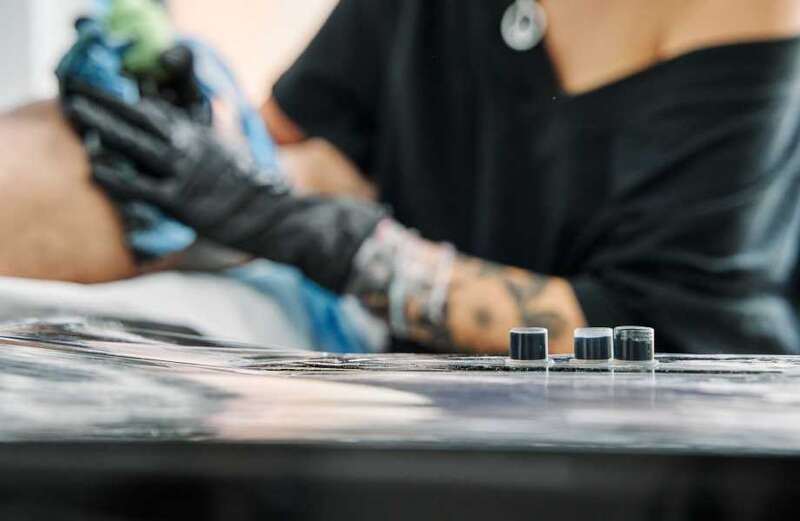WHEN planning a tattoo, most of us will spend ages thinking about the design, placement, whether or not it'll hurt.
And despite the 'tattoo horror stories' littering social media, we tend to worry more about a spelling fail than tainted tattoo ink.

You might want to be vigilant if you're planning a new tat, as the US's Food and Drug Administration (FDA) issued a warning about contaminated ink resulting in dangerous infections and 'serious injuries'.
The agency said pigments used to adorn your skin could in some cases contain microorganisms that could be 'injurious to health', calling on manufacturers and distributors to be cautious of situations which could result in nasty infections for people getting inked.
"The FDA received multiple reports of illnesses caused by microbially contaminated tattoo inks, and subsequent testing by the agency also uncovered microbial contamination in sealed tattoo ink bottles," it wrote in a recent alert.
 Horror tattoo bungle leaves woman blind after eye-inking goes wrong
Horror tattoo bungle leaves woman blind after eye-inking goes wrong
Between 2003 and 2023, there were 18 recalls of tattoo inks that were contaminated with various microorganisms, according to the FDA.
And in 2019, the agency issued a safety alert to people considering a tattoo and artists to avoid using three specific inks that were contaminated with microorganisms.
Clinical professor of dermatology at the University of Pennsylvania Health System told WebMD that he'd seen several tattoo-induced infections that are caused by "organisms that tend to contaminate things in damp, liquid-type environments".
Why does tattooing make you vulnerable to infections?
In its newly issued draft guidance, the FDA described the tattooing process and detailed why it can leave you vulnerable to infections.
Your skin is composed of multiple layers, it explained, including the epidermis - the outermost skin layer that's the body’s primary physical barrier against pathogens - and the dermis, the deeper layer that contains blood and lymphatic vessels.
"Microorganisms are normally present on the epidermis, but not in deeper skin layers, such as the dermis," the FDA continued.
While some microorganisms won't cause harm when they come into contact with your dermis, their presence "in deeper skin layers may give rise to infection and inflammation".
As tattooing "involves puncturing the epidermis about 100 times per second with needles and depositing ink 1.5 to 2 millimetres below the surface of the skin, deep into the dermis,” it can leave you vulnerable to 'infections and serious injuries' if the ink is contaminated.
"Because these inks are injected, pathogens or other harmful substances in these inks can travel from the injection site through the blood and lymphatic systems to other parts of the body," the FDA said.
Commonly reported symptoms of tattoo ink-associated infections include rashes, blisters and granulomas, some of which have resulted in permanent scarring.
 'My mother-in-law tattooed my baby's name on her arm - but we want to change it'
'My mother-in-law tattooed my baby's name on her arm - but we want to change it'
Microbiological infections caused by tattoos can also include impetigo - a common and highly contagious skin infection that causes sores and blisters - and other skin infection such as erysipelas, cellulitis.
According to the FDA, infections can also cause "life-threatening complications such as endocarditis (a rare and life threatening heart infection), septic shock, and multi-organ failure".
And it warned that infections can be difficult to recognise as they can be mistaken for allergic reactions, leading to misdiagnosis and ineffective treatments.
Because tattoo ink is considered a cosmetic product, the sterility and quality of ingredients sometimes varies, Teo Soleymani, MD, an assistant clinical professor of dermatology and dermatological surgery at the UCLA David Geffen School of Medicine, told WebMD.
“What we've seen many times is inadvertent contamination during the application process or contamination while the inks are being made.”
In years past, unclean needles spreading hepatitis and HIV were more of a concern, but those rates have dropped significantly, according to Professor Soleymani.
But infections from rare bacteria that exist in stagnant water have increased and they are injected into a part of the body that allows them to evade the immune system, he said.
In some cases, if antibiotics don't work to kick the infection, the tattoo might require surgical removal.
“The aesthetic you were going for has to be not only removed, but you're left with a surgical scar,” Professor Soleymani said. “Tattoos can be beautiful, but they can come with unwanted visitors that can cause months of misery.”
According to the FDA's guidance, unsanitary manufacturing conditions that may lead to ink contamination include:
- Preparing or packing of tattoo inks in facilities that are hard to sanitize, such as carpeted areas
- Ink or ink components left uncovered, especially near open air ducts
- Unsanitary mixing of tattoo inks, including with unclean utensils or containers
- Lack of appropriate attire by staff, failure to use hairnets, lab coats, aprons, gowns, masks, or gloves
Last month, a dad died after contracting a serious infection from an unlicensed tattoo artist.
Tattoo artists have previously advised Sun readers to avoid these specific body parts if considering new ink.



































